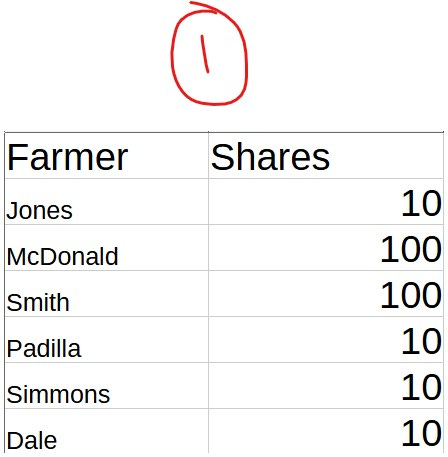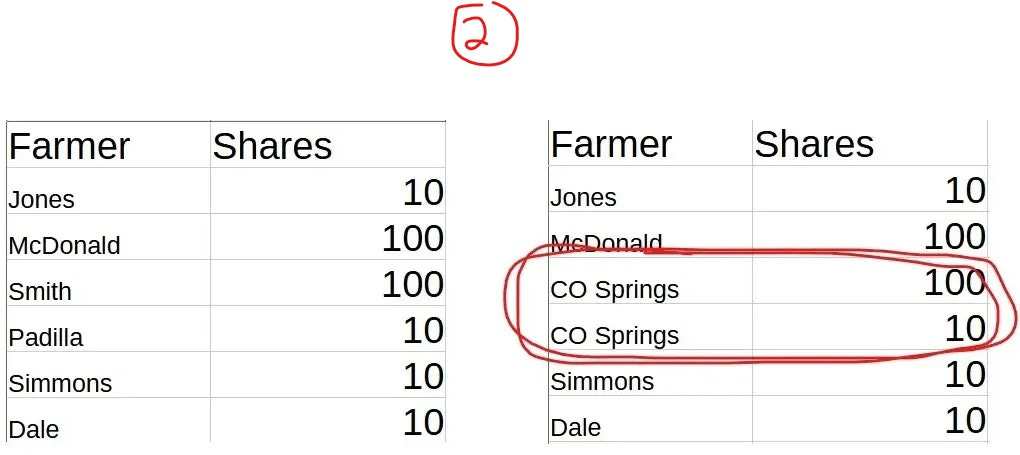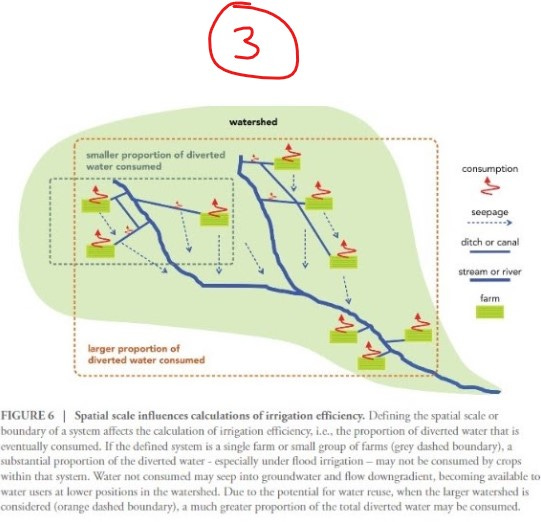What's harmful about just a few farmers selling their water rights? I don't think the Aurora Sentinel understands or respects you.
What's harmful about just a few farmers selling their water rights? Won't the others still get water?
When I did an earlier series on the Lower Arkansas River Valley and water sales (see the first link below), I had a reader suggest that I discuss the harm done to the remaining farms when only a few of the farmers sell their water. Interestingly enough, when I was in the Valley talking to people, this same suggestion was put forward.
I recently had a phone conversation with Lower Arkansas Valley Water Conservancy District manager Jack Goble about this topic. The below is not a transcripted interview, but the material is the fruit of that conversation.
Why is it harmful if only some farmers sell their water rights? Here I will confine myself to discussing operations where farmer gets his or her water from a ditch. The dynamics are more complicated if we're talking about people who have nearby center pivot well irrigation.
Let's take a step back and talk the basics of ditches first. Diversion ditches, where water is taken from a river and sent to farms, are owned and maintained by ditch companies. Farmers buy into the ditch company in a similar manner to the way you might buy a publicly traded company: by buying shares.
And, just like with stock, when decisions need to be made about the ditches, the farmers vote their shares. I.e. if you bought 100 shares of the Gaines Valley Ditch Company, at every meeting, you would have 100 votes to cast. With my 10 shares, I'd have 10 votes.
The number of shares also regulates how much of the water in the ditch you can take out. It's a proportion of a whole, just like with the votes.
With that under our belt, let's consider a hypothetical. Say the Gaines Valley Ditch Company has the farmers listed in Screenshot 1 with their corresponding shares.
Some of these farmers are approached by the City of Colorado Springs and decide to sell their water (their shares) to the city and let their land go dry. That change is now shown in screenshot 2.
So the Smith and Padilla farms are now dried up, and the City of Colorado Springs takes their water out at the head of the ditch (or from higher up in the river), diverting it up to a thirsty city.
There are the obvious harms attendant upon drying up some land next to other working land. I covered that in my previous newsletter linked below. I won't go into that level of detail here again. Suffice it to say that the fallowed land doesn't sit empty long: the prairie dogs and weeds that move in get comfy and then start eyeing the producing land next door for expansion.
It goes beyond this, however.
When a single entity starts buying up ditch shares, it concentrates voting power. Look again at screenshot 2. You now have the Springs with 110 votes. They are not at 50% of the total votes (240) yet, but that 110 votes is a significant voting block that speaks with a single voice.
In speaking with Mr. Goble about this, he offered the example of the Ft Lyon canal, a canal where the Springs has indeed bought up a large, though not controlling, number of shares. The remaining farmers on that canal sought to pass a measure at their meeting that would have required the Springs to foot the bill for the engineering and legal work required to effect the transfer of water to them as the new owners. The Springs' voting block (along with not enough of the farmers coming to the meeting to stop it) ensured that this didn't happen.
Now everyone on that ditch, even the folks that didn't sell their rights who incidentally constitute the majority of shares, gets to help pay so the Springs can take the water out of the valley.
The second reason Mr. Goble and I discussed is a little more technical, but just as important. Water running in a ditch is not in a sealed container and thus where you draw it from matters. To give you a sense of this, take a look at screenshot 3 which comes from the second link below. If the caption is too small to read, click in the link and scroll to figure 6.
Prior to the buy up, the farmers on my hypothetical Gaines Valley ditch all took their water out from various points along the ditch next to their farms. When the Springs bought out Smith and Padilla, they started taking their water out from higher up in the river (not the ditch).
This means less flow into the ditch, but what you may not account for are the changes to the dynamics of evaporation and seepage (the water that leaks through the bottom of the ditch into the ground -- an amount that can vary greatly depending on whether and with what the ditch is lined).
The seepage and the amount of water that is returned to groundwater of any river system depends greatly on where the water is taken out of the system and where it's used. In figure 3 you see a schematic of one of the processes that can occur. The farms that are in the smaller dashed box take their water out of the ditch high up, but use it for flood irrigation .
Whatever water not used by the plants recycles into the groundwater/river system to be used by those downstream. That is less is lost from the system as a whole. It's better for the river and for the farmers who need it.
If that water were to be pulled out and shipped away to a city, NO portion of it re-enters the system to be used by those downstream. The river and the farmers downstream lose.
Keep this in mind if you, like me, had the misapprehension that somehow one person selling out their water didn't affect others. Perhaps one or two on a large ditch company (depending on how many shares that were sold) wouldn't do too much harm, but it doesn't take many owners to sell to start adversely affecting those that remain.
Some way or another, this must be accounted for and should be remediated in any sort of sale.
https://www.montanawatercenter.org/assessing-consequences-of-changing-irrigation-methods
Related:
A well done video profile about farmers and water in the Lower Arkansas.
Letting them speak about their concerns in their own voices. Worth a watch, especially if you are not familiar with Agriculture.
p.s. quick note: there is a little nibble in there about a CSU research station experimenting with cowpeas as a drought resistant and/or lower water use crop. That story's been told multiple times by now. You will pardon some healthy skepticism on my part.
p.p.s. note the lining in the farmer's ditch. Minimize seep.
I don't think the Aurora Sentinel, (like many media outlets) understands and/or respects you.
There's a big flap going on right now in Aurora over Venezuelan gangs and whether or not they're taking over areas of the city, certain apartments, certain buildings.
I have no idea what the truth is about Venezuelan gang(s) in Aurora is. I'm not going to wade in on that. I would urge good general sense in the matter if this is an interest: read widely and skeptically. There are likely players on both sides of the issue trying to influence you and/or push a simplistic view of things.
The point here is not whether or not the gangs are taking over. The point here is hiding in plain sight. Right down there in the Aurora Sentinel article linked below.
It's like the smell of onions cooking in your house--that one that you've ceased to notice until you go outside for a while before stepping back in. Perhaps the media lumping everyone together and assuming your intent and thought simply by affiliation has gotten to be so commonplace that it doesn't register.
Let me pull some quotes so you can see what I mean:
"The group’s [the Venezuelan gang Tren de Agua] reported presence in the city has been the subject of headlines on Fox News and other national news outlets in recent days and has triggered viral, sky-is-falling chatter on conservative social media."
"In the meantime, the Aurora Police Department’s silence about alarming claims by Jurinsky, Coffman and Republican congressional candidate John Fabbricatore from Aurora has left the public trying to figure out what’s true about the potential gang threat and what amounts to political grandstanding pushing an anti-immigrant narrative."
I'm going to point you to another one: the use of the phrase "transphobic".
"sky-is-falling chatter on conservative social media", "anti-immigrant narrative", "transphobic".
Again, these sorts of phrases are so common in some media outlets anymore that they slide right past you. Stop, however, and think through what this says.
Whatever you believe about the Venezuelan gangs, transgenderism, pick your favorite current hot button, like it as not, you as a conservative will be lumped into a big group.
A big group which carries the same monotone color to those in the left-leaning media, a color somewhere in the range of shades of awful pea-soup grey/green or brown/yellow like stained teeth.
Hear things about Venezuelan gangs and get concerned for your safety because of it?
Have concerns about immigration because you're worried about gangs tagging along with, and embedded in, people escaping persecution?
Have concerns about how we handle the issue of genetic males playing sports against genetic women? About how you work out sleeping arrangements for students sharing rooms on an overnight trip?
Outlets like the Aurora Sentinel are here to help usher you into the same basket of deplorables held open for the truly extreme.
I wonder if the words they use would be different if the reporters left their bubbles. If they had friends who were conservative and could point to the spectrum of opinion on the matter that lies to the right of center.
Surely for some reporters it wouldn't matter. For those that are advocates masquerading as journalists, they have their opinion, they know what they're doing, and reality is not going to intrude.** The desired result is obvious. Label challenging thoughts and ideas as extreme enough to not need to be reckoned with in any serious way. I have emailed my share of reporters who hold views like these.
For those that aren't, I have a recommendation. If you lament the lack of trust you and your colleagues enjoy with Americans, perhaps some care in your phrasing is due. Perhaps some recognition that humans are individuals is due. This is especially important to cultivate when the group is outside your tribe.
Take the time to talk to people who may hold views contrary to yours. Show the respect of relating those views in a truthful and complete way to others. Won’t fix the trust issue itself, but it’d go a long way.
**I do not know the reporter for the Sentinel here, Susan Greene, but a read of her article points to her orientation: hers is the type of news where she's not there to explore reality but rather to find things that bolster her already-made-up mind.
https://sentinelcolorado.com/metro/polis-tamps-down-media-frenzy-over-venezuelan-gang-issue-in-aurora/







